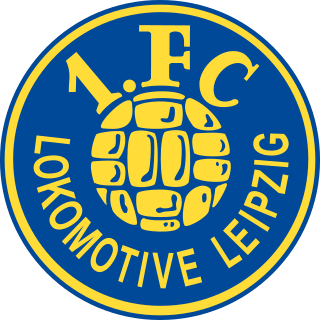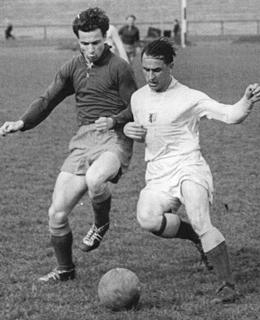Related Research Articles

The DDR-Oberliga was the top-level association football league in East Germany.

1. Fußballclub Lokomotive Leipzig e.V. is a German football club based in the locality of Probstheida in the Südost borough of Leipzig, Saxony. The club may be more familiar to many of the country's football fans as the historic side VfB Leipzig the first national champion of Germany. It has also been known as SC Leipzig. The club won five titles in FDGB-Pokal and the 1965–66 Intertoto Cup during the East German era. It also finished runner-up in the 1986–87 European Cup Winners' Cup. 1. FC Lokomotive Leipzig was renamed VfB Leipzig after German re-unification and managed to qualify for the Bundesliga in 1993. However, like many clubs of the former DDR-Oberliga, VfB Leipzig faced hard times in re-unified Germany and a steady decline soon followed. 1. FC Lokomotive Leipzig was refounded in 2003 and has reclimbed through divisions since then. The team competes in the fourth tier Regionalliga Nordost as of 2021. The 1. in front of the club's name indicates that it was the first to be founded in the city.

Hallescher FC, sometimes still called by its former popular name Chemie Halle, is a German association football club based in Halle an der Saale, Saxony-Anhalt. The club currently plays in the 3. Liga, the third highest level in the German football league system. For many years, Halle had been in East Germany's highest league, the DDR-Oberliga, up-until the German reunification. However, like many other teams from the former East, it then suffered the effects of economic and demographic decline in the region in the 1990s and fell down to amateur leagues. Since 2000, Hallescher FC has ended its downward trend and in the 2011–2012 season, they finally returned to a professional football league after 20 years of absence.

The FDGB-Pokal was an elimination football tournament held annually in East Germany. It was the second most important national title in East German football after the DDR-Oberliga championship. The founder of the competition was East Germany's major trade union.

The football league system of the German Democratic Republic existed from 1949 until shortly after German reunification in 1991.
The 1952–53 DDR-Oberliga was the fourth season of the DDR-Oberliga, the first tier of league football in East Germany.
The 1954–55 DDR-Oberliga was the sixth season of the DDR-Oberliga, the first tier of league football in East Germany. After the 1954–55 season the league played a transition round in autumn 1955, followed by five seasons, until 1960, where it played in the calendar year format. From 1961–62 onwards the league returned to its traditional format.
The 1963–64 DDR-Oberliga was the 15th season of the DDR-Oberliga, the first tier of league football in East Germany.
The 1965–66 DDR-Oberliga was the 17th season of the DDR-Oberliga, the first tier of league football in East Germany.
The 1977–78 DDR-Oberliga was the 29th season of the DDR-Oberliga, the first tier of league football in East Germany.
Football club (FC) was a designation for a specially promoted club for elite football in East Germany. The football clubs were formed during the winter break 1965-1966 as centers of excellence in East German football. The football clubs enjoyed considerable advantages over other sports communities in East German football. In addition to the ten designated football clubs, SG Dynamo Dresden was also promoted in a similar way to the dedicated football clubs from 1968.
The all-time DDR-Oberliga table is a cumulative record of all match results, points, and goals of every team that played in the former East Germany's first division DDR-Oberliga from its inception in 1949 until its dissolution in 1991 following German reunification. It awards two points for a win and one point for a draw, as this was the system in use at the time. The matches of the transition round made necessary by the adoption of a Soviet-style calendar year schedule in 1955 are not included. In its final season (1990–91), the competition was known as the NOFV-Oberliga, before becoming part of the German Football Association.

Günter Konzack was a former East German football player. He played in the top-flight DDR-Oberliga for BSG Turbine Erfurt and SC Lokomotive Leipzig. After his playing career Konzack worked as manager.
The 1978–79 season saw the 28th competition for the FDGB-Pokal, the East German national football cup. Starting from the third round, the fixtures were played over two legs, culminating in a one-legged final.
A sports club (SC) was a specially promoted sports club for elite sport in the East German sports system. The sports clubs emerged in East Germany after 1954. They were initially founded by the so-called sports associations (SV), which served as umbrella organizations for the sports communities (SG) or enterprise sports communities (BSG) of the different trade union areas in East Germany. The East German sports management tightened up the system in the early 1960s and instead set up regional district sports clubs. The sports clubs existed in this form until the end of 1990, when they were either dissolved or given new legal statuses based on the West German model. The system of sports clubs came to prove itself in view of the very large number of medals that athletes in East Germany won in the Olympic games and in European and World Championships.
The Oberliga or DDR-Eishockey-Oberliga was the top level of ice hockey in East Germany. From 1949 to 1970, the increasingly popular sport of ice hockey saw the creation of a variety of leagues, with the Oberliga at the top level. However, in 1970 funding for all but two ice hockey teams was abruptly ended by the Politburo. Some of the de-funded teams went on to participate in the DDR-Bestenermittlung, an unofficial continuation of the former "Gruppenliga".

FC Mecklenburg Schwerin is a German football club based in Schwerin in Mecklenburg-Vorpommern. The club was formed from a merger in 2013 and competes in the sixth tier Verbandsliga Mecklenburg-Vorpommern. The club plays its home matches at the Sportpark Lankow. FC Mecklenburg Schwerin also has gymnastics squads and an Esports department.
BSG Chemie Leipzig was a German football club from the Leutzsch district of Leipzig, Saxony. The prewar identity of the club is rooted in the establishment of Britannia Leipzig in 1899 and its successor TuRa Leipzig. During the socialist era the traditions of the club were continued in the East German teams BSG Chemie Leipzig and SC Lokomotive Leipzig before the emergence of FC Sachsen Leipzig following German reunification, which continued the clubs traditions.
The history of BFC Dynamo began with the founding of sports club SC Dynamo Berlin in 1954. The club entered the 1954-55 DDR-Oberliga after taking over the first team of SG Dynamo Dresden and its place in the league. The relocation was designed to provide the East German capital with a competitive team that could rival the teams from West Berlin. Prominent players in the team in the late 1950s were Günter Schröter, Johannes Matzen, and Herbert Schoen. SC Dynamo Berlin captured its first trophy in the 1959 FDGB-Pokal. The team then finished the 1960 DDR-Oberliga as runners-up. However, the team of SC Dynamo Berlin in the 1960s would be relatively weak. It would be overshadowed in the capital by ASK Vorwärts Berlin.
References
- John Dwyer. "The Abseits Guide to German Soccer" . Retrieved 19 November 2006.
- "Kicker Sonderheft". various issues, 1989–2006.
{{cite journal}}: Cite journal requires|journal=(help)